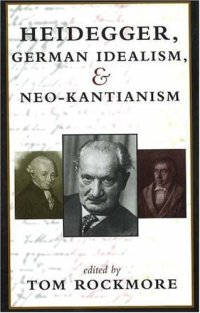
Ebook: Heidegger, German Idealism, and Neo-Kantianism
Author: Tom Rockmore (editor)
- Year: 2000
- Publisher: Humanity Books
- Language: English
- djvu
Martin Heidegger, a leading German philosopher of the twentieth century, has left an indelible mark on existentialism and phenomenology. He has influenced a cross-section of some of the most important later philosophers, including Hans-Georg Gadamer and Jacques Derrida, as well as Herbert Marcuse, Hannah Arendt, Jean-Paul Sartre, Maurice Merleau-Ponty, and many lesser-known figures. Merely in terms of influence, even Heidegger's philosophical foes acknowledge that he is arguably the most important philosopher of the century. The influence of early Greek thought on Heidegger's philosophical development is well documented, but Heidegger's relation to modern philosophy, particularly that of German idealists such as Immanuel Kant, Johann Gottlieb Fichte, and G.W.F. Hegel, has not attracted the attention it deserves. Kant is particularly crucial to understanding Heidegger, since the reformulation of Kantian thought that led to German neo-Kantianism provided an important part of the intellectual climate in which Heidegger formulated his own position. HEIDEGGER, GERMAN IDEALISM, AND NEO-KANTIANISM examines the little-known but crucial link between Heidegger's theories and his reading of German philosophy -- especially idealist and neo-Kantian strains. The analyses and evaluations of Heidegger's writings offered here represent a wide range of views, running from those who agree with Heidegger to those who are deeply critical. Included are essays by Alfred Denker, Douglas Hedley, Marion Heinz, Pierre Kerszberg, Theodore Kisiel, Rudolf A. Makkreel, Claude Piche, Claudius Strube, Veronica Vasterling, Jean-Marie Vaysse, and Ben Vedder.
Download the book Heidegger, German Idealism, and Neo-Kantianism for free or read online
Continue reading on any device:

Last viewed books
Related books
{related-news}
Comments (0)